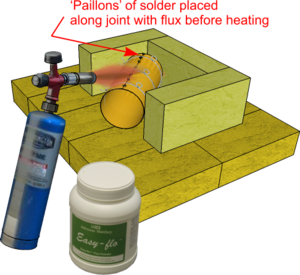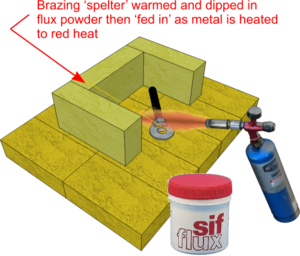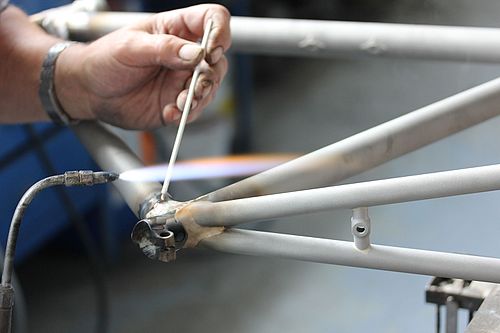Hard Soldering
From DT Online
Description
Hard Soldering is taken to include those metal joining techniques in which a filler rod is used as the joining medium, heat is provided by a gas torch and there is no melting of the parent metal. In this context, it includes Silver Soldering and Brazing but not Welding.
By contrast, Soft Soldering is a method of joining metals with a Eutectic Tin/Lead Alloy and the heat source is often a Soldering Iron.
Silver Soldering
Silver Solder is an Alloy of Silver and a small amount of Brass. The addition of Brass is to lower the melting point of the Silver. The amount added will determine the actual melting point of the solder and this allows the creation of different grades of Silver Solder covering a range of melting points - typically Hard, Medium and Easy. A Silversmith for example, may have to solder several times during the creation of a product and a range of melting points enables successive joints to be made without melting previous ones.
Joints to be soldered must be clean, close fitting and may need to be wired or held together in some way to avoid distortion during subsequent heating. A Flux is need to prevent the joint becoming contaminated with Oxides and to help the solder flow. Common household Borax is suitable and much used by Silversmiths and Jewellery Makers, but proprietary Easy-flo Flux is a convenient ready-made alternative.

A typical soldering technique is as follows :
- wire the joint together with soft iron binding wire,
- ‘paint’ the joint with Flux,
- place small ‘Paillons’ of solder along the joint,
- use a gas torch to heat gently to start, allowing the Flux to dry out and melt without disturbing the solder,
- increase the heat and raise the temperature to red heat to make the solder melt then flow along and through the joint.
- allow to cool, remove any wire binding and Pickle to clean.
Brazing
Brazing Spelter is a Brass which is used as the filler rod when Brazing steel and similar materials (i.e. not Brass or Gilding Metal, for example, since there is a danger these would also melt at the temperatures reached during the process).

Most heat joining techniques work best if the joints are clean and close fitting but the Fluxes used in Brazing (e.g. SIF) tend to be ‘active’ in that, in addition to shielding the joint from air, they also clean it to an extent and are therefore more tolerant of surface contamination.
A typical Brazing technique is as follows :
- if required, wire the joint together or hold it within a Jig for example,
- using a gas torch or a welding torch to bring the joint up to bright red heat.
- warm the end of a length of Brazing Spelter and dip it into Flux powder.
- introduce the Flux coated rod to the heated metal and melt both together into and along the joint.
- allow to cool slowly and clean mechanically (e.g. using Emery Cloth).
 |
 |
 |
 |
 |
 |
 |
 |
| LPG Gas Torch |
Gas Soldering & Brazing Torch |
Silver Solder Strip |
Easy-Flo Flux |
Borax Cone and Dish |
Brazing Rods |
Sifbronze Brazing Flux |
Iron Binding Wire |
